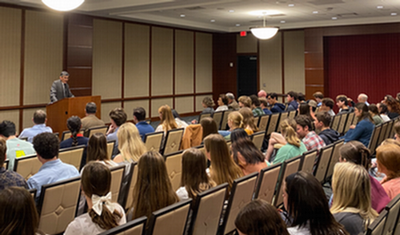
Paul Carrese, professor in the School of Civic Thought and Leadership at Arizona State University, recently delivered a lecture at Samford University regarding the United States Constitution and civic virtues, an event supported by the Carolyn and Don Drennen Endowment for American History, Civics and the Constitution.
Two Howard College of Arts and Sciences students, senior Annie Kelly and sophomore Ella Ford, set the stage for the event by reciting the Constitution’s preamble.
The lecture began with introductory remarks from Jonathan Den Hartog, professor and chair of Samford’s Department of History, who acknowledged Samford’s privilege in hosting Carrese, a leading scholar in civic education and American political thought.
In his address, Carrese warned that the current period of calm in national politics could be short-lived, suggesting that Americans should prepare for future unrest.
“We should expect a new cycle of bitter contentiousness and angry polarization to start again,” Carrese said, pointing to systemic deficits in civic education that extend across both K-12 and higher education.
Carrese explained that sustaining a strong democratic republic requires citizens who are well-versed in American political history and constitutional principles. He highlighted the need to cultivate key civic virtues that can support this aim.
“These several indispensable civic virtues—civil disagreement, civic friendship and reflective patriotism—are necessary for the functioning of a pluralistic society,” Carrese said.
Reflecting on the importance of unity, Carrese underscored America’s unique national identity, which draws strength from a blend of backgrounds, philosophies and ideas.
“America’s challenge is that our national motto, E Pluribus Unum, not only unites states but also reflects the diversity of ideas, backgrounds and philosophies that make up our citizenry,” Carrese said.
The lecture brought attention to the pivotal role of educators in addressing what Carrese described as “civic decay.” He cited recent studies showing widespread deficiencies in civic knowledge among Americans of all ages.
“According to these studies, only 22% of eighth graders reach basic proficiency in civics, with similar issues persisting among college students, many of whom struggle to identify key historical figures or fundamental civic concepts,” Carrese said.
Carrese urged higher education institutions to respond to these findings by making civic education a priority in their curricula. He referenced the Educating for American Democracy report, a bipartisan national study advocating for comprehensive civics instruction from kindergarten through college.
“This report emphasizes the need to instill civic virtues that enable citizens to handle political diversity constructively,” Carrese said. “It allows for a thoughtful patriotism that balances love for the country with critical engagement.”
Students responded with perceptive questions, demonstrating their active reflection on their role in society.
Attendees noted that the reception of Carrese’s challenge indicated Samford’s institutional commitment to exploring foundational American principles and fostering an informed citizenry.
